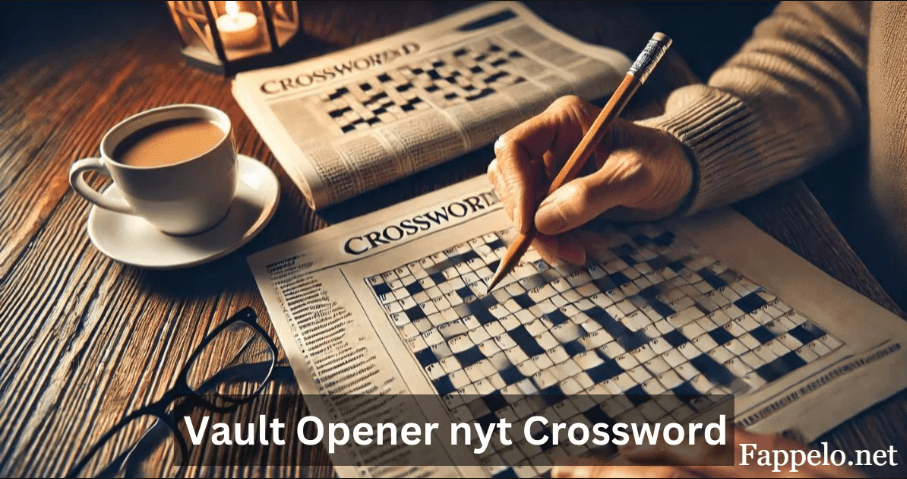Introduction
The New York Times Crossword is one of the most iconic and challenging puzzles for avid solvers. Every day, enthusiasts eagerly wait to tackle a new puzzle, testing their knowledge, wit, and problem-solving skills. Recently, one clue in particular has sparked curiosity and challenge: “Vault Opener” in the NYT crossword.
It has intrigued many puzzle solvers, leaving them to ponder what the answer could be. In this article, we’ll explore the vault opener NYT crossword clue, the strategies behind solving tough crossword clues, and why this specific clue presents an interesting challenge.
What Is the “Vault Opener” in the NYT Crossword?

If you’re an avid crossword fan, you might have come across the term “vault opener” while solving a puzzle. The vault opener NYT crossword clue is typically asking for an answer that can unlock or “open” a vault, either literally or figuratively. This clue may seem like a straightforward question at first glance, but like many NYT crossword clues, it’s often trickier than it appears.
The vault itself could be a literal stronghold for money, like a bank vault, or something more abstract, like a “vault” in gymnastics. The term “opener” may refer to someone or something that can unlock or open a vault.
But there’s a twist. The NYT crossword puzzles often use wordplay and clues that have multiple meanings. So, while you might immediately think of an actual vault opener, like a key or combination, the answer could be something more creative, playing off different meanings of the word “vault” or “opener.”
Strategies for Solving the Vault Opener NYT Crossword Clue
Crossword puzzles, especially those in the NYT crossword, are famous for their level of difficulty and clever wordplay. To solve the vault opener NYT crossword clue, there are a few strategies that can help crack the puzzle:
1. Focus on Wordplay
NYT crossword puzzles often use wordplay to mislead solvers. Words like “opener” could have double meanings. For example, it could refer to a person, object, or even an action that metaphorically “opens” a vault. Understanding how the words in the clue can be interpreted differently is a crucial step in solving.
2. Check for Abbreviations and Common Phrases
In some crosswords, abbreviations are used for common words. Sometimes, the answer to a crossword clue could be a term that’s abbreviated or a common phrase that fits the given number of spaces. For example, an “opener” in the crossword might refer to someone who opens a specific event, like a “keynote speaker” or even a “banker,” who would open a vault.
3. Contextual Clues
Look at the surrounding clues for hints. Crosswords are interconnected puzzles, and often the answers to neighboring clues will provide you with letters that help solve difficult ones like the vault opener NYT crossword clue. Fill in what you know and use those answers to guide your guesses.
4. Consider Double Meanings and Homophones
Words in the crossword may have multiple meanings, or they may be homophones (words that sound alike but have different meanings). For example, “vault” might refer to a physical vault, but it could also refer to a leap or a high jump in gymnastics. If you consider both meanings, you might come up with a different answer than you originally thought.
The Common Answers to “Vault Opener” Clues
As you attempt to solve the vault opener NYT crossword, you’ll want to keep some common answers in mind that might fit with this particular clue. Here are a few answers that commonly appear in crosswords for clues related to “opener” or “vault”:
1. Key
The simplest answer might be “key.” A key is a direct answer to the “vault opener” clue because it’s a tool used to open physical vaults. It’s a common crossword solution, especially when the clue refers to something that unlocks or opens something.
2. Bank Teller
A “bank teller” might also be a good fit for the clue. In this case, a teller works in a bank and often deals with vaults or safes that hold money. This answer would fit well if the puzzle is themed around financial institutions or daily jobs.
3. Gymnast
If the vault opener NYT crossword clue is referencing a gymnastics event, then “gymnast” could be the answer. In gymnastics, “vault” refers to a high jump performed by athletes. In this case, the “opener” could metaphorically refer to a gymnast performing the vault.
4. Combination
A “combination” is another potential answer. A vault often requires a specific combination to open it. This would fit well if the puzzle is using a more figurative interpretation of “vault opener.”
The Appeal of Solving Crossword Puzzles
Solving crossword puzzles, especially a tough one like the vault opener NYT crossword, is a fun and rewarding experience for many people. There are several reasons why puzzles, particularly those in the New York Times, have such a large and dedicated following:
1. Mental Exercise
Crossword puzzles provide excellent mental stimulation. They challenge your brain, improve your vocabulary, and require you to think critically and creatively. Solvers get to exercise their problem-solving skills every day.
2. Satisfaction of Completing the Puzzle
There’s a great deal of satisfaction in completing a crossword puzzle, especially a challenging one like the vault opener NYT crossword. It’s not just about finding the answers; it’s about piecing everything together and finishing the entire puzzle.
3. Timing and Competition
The NYT crossword is also an exercise in time management. For many, there’s an added layer of competition—whether against the clock or friends—creating a sense of urgency that makes solving even more fun. Some solvers try to complete the daily puzzles in as little time as possible, pushing themselves to improve each day.
4. The Social Aspect
There’s a social element to crossword solving as well. Many crossword enthusiasts participate in online communities where they discuss difficult clues and share solving tips. The vault opener NYT crossword is just one example of a clue that gets crossword fans talking and debating about possible answers.
Why the Vault Opener NYT Crossword Clue Can Be Challenging
The vault opener NYT crossword clue stands out because it asks solvers to think about the word “vault” in multiple ways. Depending on the theme of the puzzle, the answer could involve something related to banking, gymnastics, or even a metaphorical “opening.” This broad range of potential answers makes it difficult but also more satisfying to solve.
Another reason it can be challenging is that the NYT crossword is known for its difficulty curve. The puzzles start off relatively easy at the beginning of the week and become progressively harder. The “vault opener” clue may be one of those tricky midweek clues that stumps solvers who may not have considered all the possible meanings of “vault.”
The Satisfaction of Solving
The true enjoyment of crossword puzzles comes from the process of figuring out each clue and completing the puzzle. For those who manage to solve the vault opener NYT crossword, there’s an added sense of achievement. It’s not just about filling in the blanks; it’s about using your mind to crack a puzzle that seemed impossible at first. There’s a unique pleasure in uncovering the correct answer to a tough clue like “vault opener.”
Conclusion
In conclusion, the vault opener NYT crossword clue serves as a great example of the challenging and rewarding nature of New York Times crosswords.
Whether the answer turns out to be a “key,” “bank teller,” “gymnast,” or “combination,” the process of solving this puzzle is what keeps solvers coming back. Crosswords, including the NYT version, offer both a mental workout and a satisfying sense of accomplishment.
The vault opener NYT crossword clue is just one small piece in a larger puzzle, but it’s the kind of challenge that makes solving the NYT crossword so much fun.



